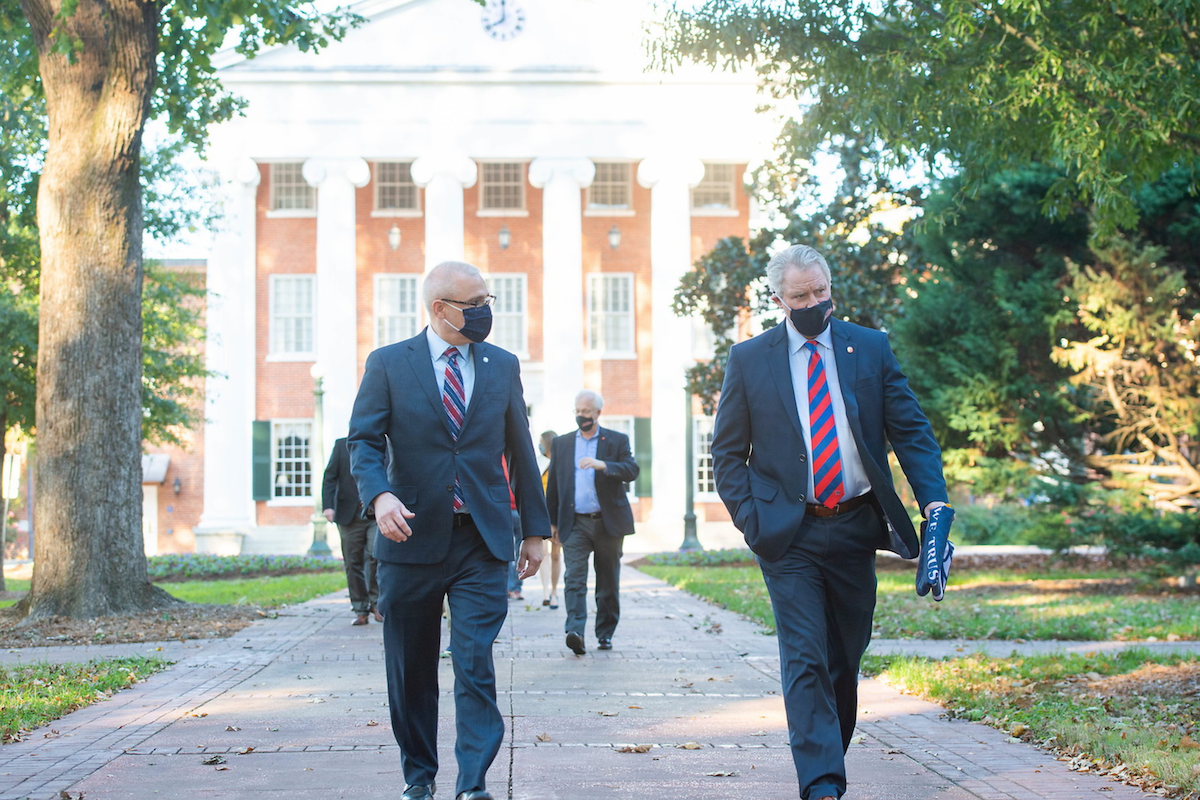The University of Mississippi has placed its ombudsman, Paul J. Caffera, on administrative leave and is seeking a temporary replacement after he sued to stop the university from compelling him to share confidential information about faculty, staff and graduate students who have privately confided to his office about issues on campus.
University officials hoped Caffera would help the UM Equal Opportunity & Regulatory Compliance office, which oversees Title IX enforcement issues, in its efforts to identify whistleblowers who exposed issues of racism and sexism in the school’s relationships with wealthy donors.

“The University asked Mr. Caffera to divulge confidential information, and threatened (him) with adverse employment action for failure to do so,” his attorney, Goodloe Lewis, said in a statement to the Mississippi Free Press late Tuesday evening. “Notably, the EO/RC investigation advised Mr. Caffera that it may refer matters to the University Police Department for criminal prosecution.”
The 2015 University of Mississippi Office of Ombuds charter bars the officeholder from revealing details about visitors to his office or participating in formal investigations. Lewis pointed to another section of the charter, which says “the Ombudsperson shall be protected from retaliation as a result of his/her role.”
“Nonetheless, he was placed on administrative leave after filing a lawsuit seeking to protect the confidentiality of persons using his office,” Lewis said yesterday.
Faculty members, staff and graduate students who have often relied on Caffera’s office as a place to safely raise issues on campus became worried in recent weeks that the administration could be laying the groundwork to fire the current ombudsman or eliminate his office completely.
‘This Antiracist Program Threatens Racist Donor Money’
Since Monday, more than 80 university employees and graduate students signed a letter supporting Ombudsman Paul Caffera and defending the importance of his office.
“We have found that a healthy and appropriately protected Ombudsperson’s office is essential to the integrity of the University community,” the letter said. “Without an Ombuds, many, from the faculty, to the staff and graduate students, who face workplace abuse and other serious issues would find themselves with no place to turn, and no ear to listen.”
Caffera’s potential ouster comes amid a series of investigations of UM faculty members and whistleblowers who have spoken up about issues of race, sex and other issues on campus.
Yesterday, the Mississippi Free Press’ Christian Middleton broke the story that the university has terminated Garrett Felber, a tenure-track assistant professor of history who has earned national recognition for his work on racism and the carceral state.
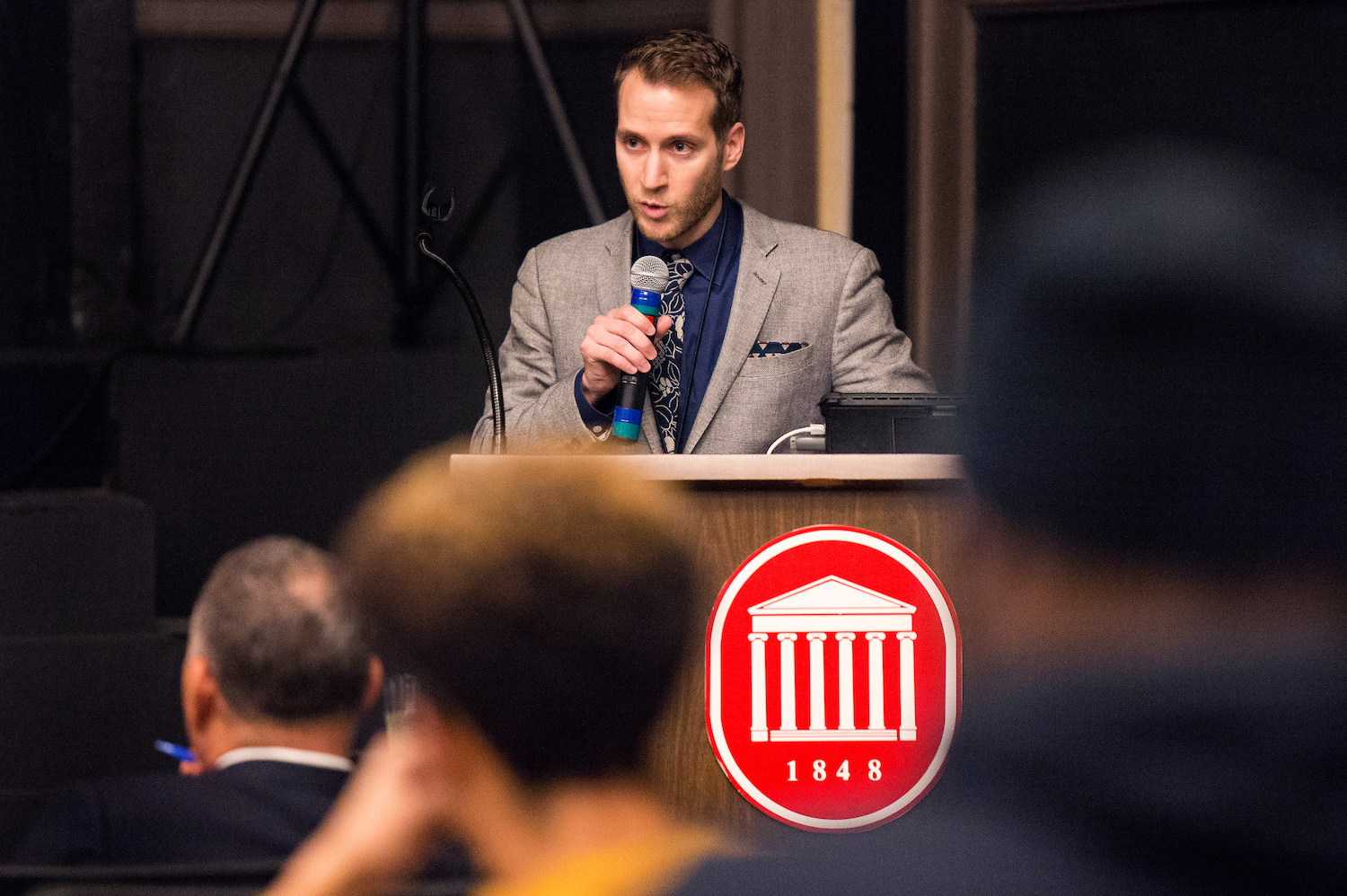
Felber also criticized the university’s relationship with powerful, racist donors in October, writing that “the real issue is that (UM) prioritizes racist donors over all else” because “this antiracist program threatens racist donor money.”
He was referring to a $42,000 grant he had successfully applied for on behalf of his department that would have funded “Study and Struggle,” an education project focused on mass incarceration and immigrant detention.
His department rejected the grant, though, and Felber said that Noell Wilson, the history chair, said it would have harmed the department’s ability to procure funding from donors. When the Mississippi Free Press contacted her in October about the grant, she declined to comment, referring questions to the UM communications department.
‘A Sorry-Ass Neo-Confederate Institution’
Kiese Laymon, a Black University of Mississippi English professor from Jackson who is known nationally for books like “How to Slowly Kill Yourself and Others in America” and “Heavy,” unloaded on Twitter last night after learning about Felber’s firing.
“Garrett Felber was fired because he lowered himself to work for a sorry-ass Neo-confederate institution that hates when folks call it a sorry-ass Neo-confederate institution. Incredible colleagues and wonderful students do not a quality institution make,” wrote Laymon, who has repeatedly spoken up about systemic racism on campus. “At least 6 progressive faculty and admin left in the last 2 years. I will be the 7th.”
“We can’t reward sorry ass institutions with our presence when they hide behind our presence when destroying faculty who love our people. The worst of white folks. Now fire me, coward. I dare you.”
“Garrett Felber,” the Black english professor wrote, “is exactly what we long for in colleagues.”
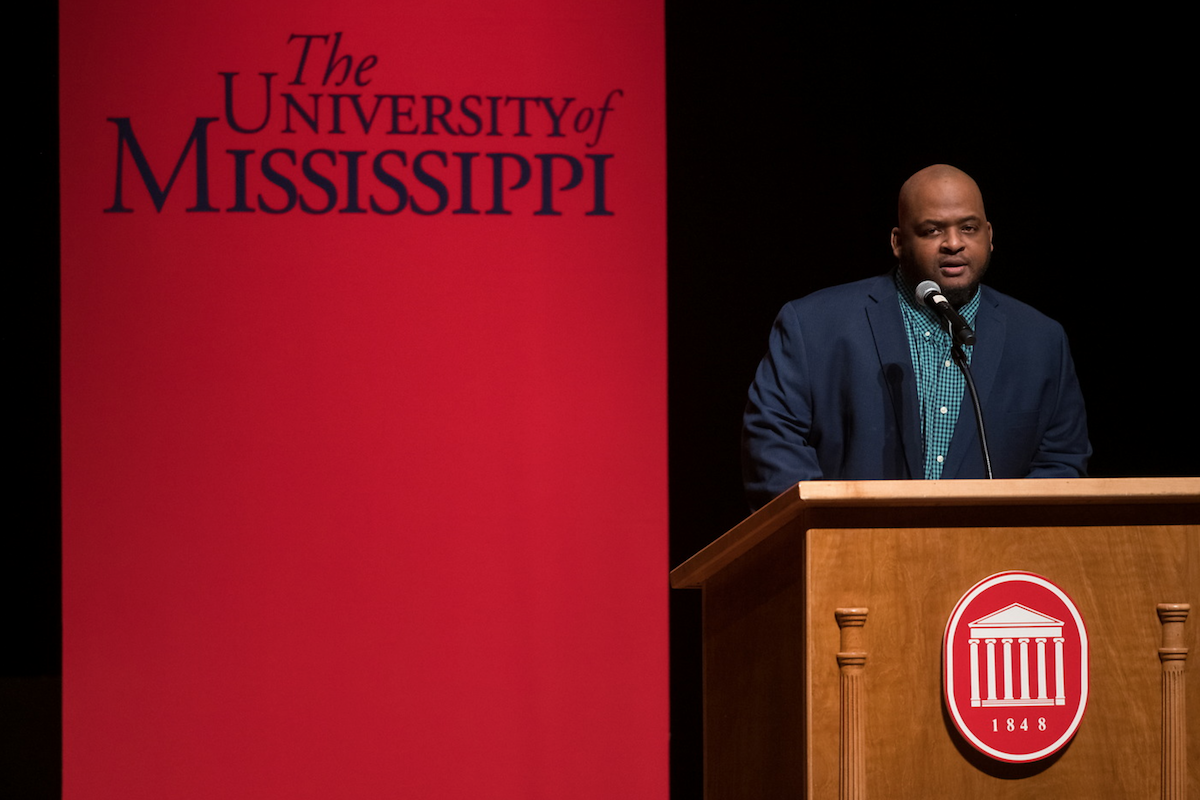
“His work was rooted in making life less terrifying for some of the most vulnerable people in my state. We ain’t fighting for a Neo-confederate slice of hell,” Laymon wrote of Felber. “They can have it. Wherever Garrett teaches next is lucky.”
Other faculty members on campus have also interpreted Felber’s firing as an act of retaliation—and fear they could meet the same fate if they speak up about issues on campus.
“The Ombuds Office should be a rock. It should be a safe haven. It should be a neutral zone,” one faculty member, who spoke anonymously to protect themself against professional retribution, told this publication on Dec. 2. “And if Paul Caffera is at risk of losing his job, then Lord help us all. Because if he can’t talk and speak up about injustice on the campus, then who can? Nobody is safe.”
Boyce to Name ‘Acting’ Ombuds
Chancellor Glenn Boyce responded to some faculty members’ concerns about the Office of Ombuds in a letter to members of the UM community yesterday afternoon.
“The University of Mississippi is not doing away with the Office of the University Ombuds. I am moving expeditiously to name an acting University Ombuds to serve on a temporary basis,” Boyce said in an email to faculty, staff and graduate students today.
The email left recipients confused and gave some the impression that Caffera had been fired; Boyce did not explain that he had placed him on administrative leave, meaning that the current ombudsman continues to receive pay and officially remains an employee but cannot perform the duties of his office.
Chancellor Boyce did not respond to a request to speak to the Mississippi Free Press for this story. Instead, Rod Guajardo, the associate director of strategic communications for the University Marketing and Communications department, sent this publication a link to the chancellor’s letter yesterday.
“That message will stand as the university’s comment at this time,” Guajardo wrote last night. He followed up early this morning, adding only that “Paul Caffera has been advised through his attorney that he continues to be employed by the university.”
In Boyce’s letter, the chancellor said that the Office of Ombuds “provides faculty, staff and graduate students with a confidential, neutral, independent and informal place to seek assistance voluntarily in bringing forth and resolving campus-related concerns, problems or disputes” in a way that “ensures that every voice at the University of Mississippi can be heard, without fear of loss of privacy, retaliation or retribution.”
But Caffera’s attorney, Lewis, told the Mississippi Free Press that those words are at odds with the university’s actions.
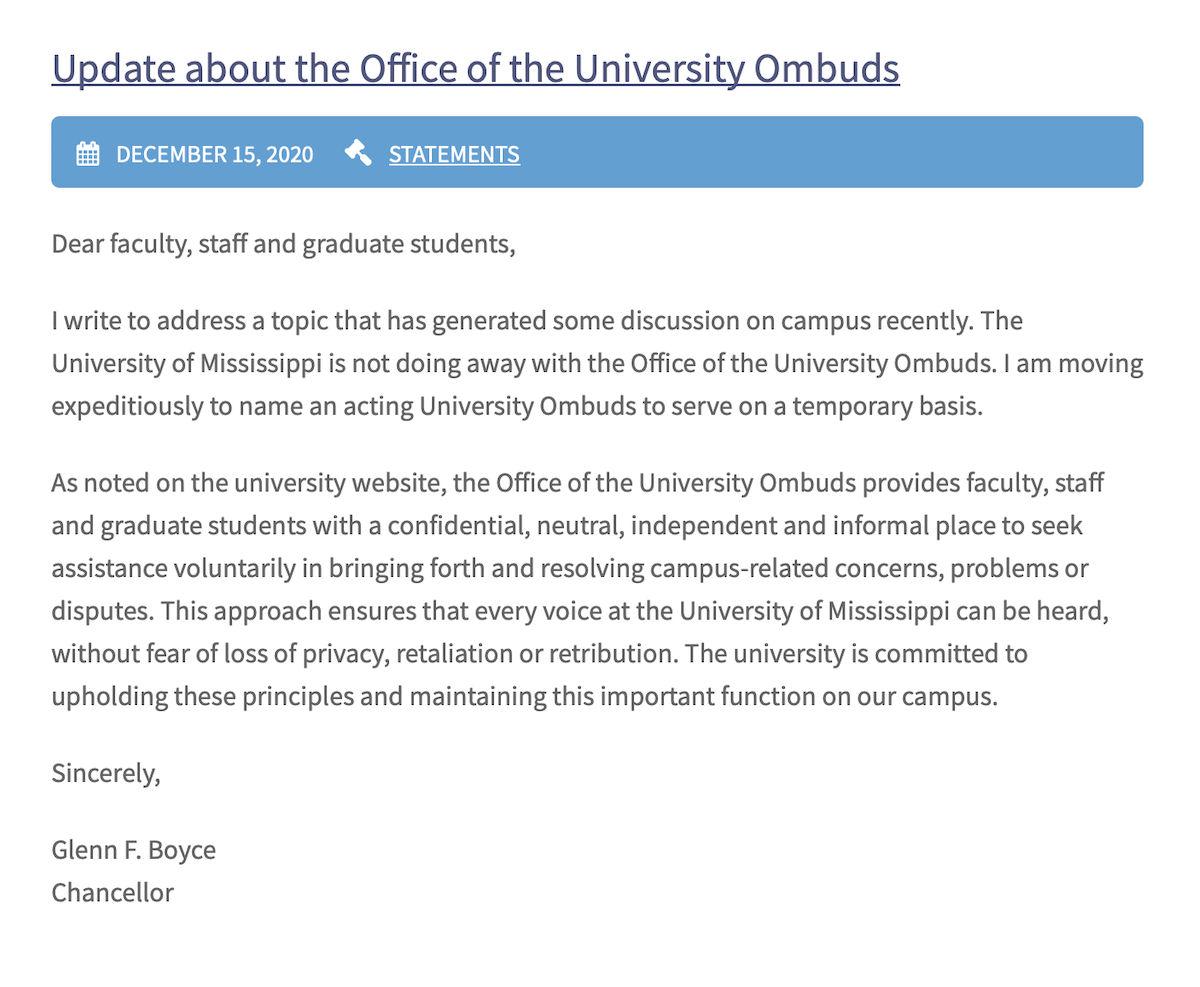
EORC officials first contacted Caffera in October, trying to convince him to turn over communications that they hoped would help unmask the whistleblowers who played a pivotal role in this publication’s “UM Emails” series. The initial three-part exposé, published in August, revealed a tangled web in which UM officials catered to certain wealthy donors’ often sexist and racist predispositions in order to procure money for the school.
In one 2018 email, UM donor Blake Tartt sent photos of Black women students on a night out in Oxford to UM Journalism School Dean Will Norton, writing, “You know Oxford and Ole Miss have real problems when black hookers are working on Jackson avenue.”
“Blake, I have been really disappointed for a long time with the way this culture is going,” the journalism dean wrote back.
In 2018, Norton publicly condemned former journalism school namesake Ed Meek for posting the photo with a similar, though less blatant, caption, and called for his name to be removed from the school. But the journalism school dean kept silent about Tartt’s role in the photos, and continued courting him for donations even as the 1984 alum and real-estate businessman continued to email him with similarly racist comments, such as using an ape emoji to refer to tennis star Serena Williams.
Norton remained silent about the emails and Tartt’s role in the Meek affair when the businessman received an appointment to the committee that ultimately selected Boyce as UM’s new chancellor in 2019.
When a whistleblower group made a public-records request that uncovered Norton and Tartt’s emails in the spring, the journalism dean abruptly resigned, telling colleagues in emails that he thought resigning could avoid the emails going public. He returned to the faculty, and while he has not taught since resigning in April, he continues to earn about $20,000 a month, including the pay bonus he received as an administrator.
After the Mississippi Free Press broke the story about the emails in the UM Emails series in August, an effort began among journalism-school faculty to uncover the identity of the whistleblowers, who some had begun receiving emails from highlighting the revelations in the stories and raising additional questions.
‘Mr. Caffera Has Not Engaged in Any Wrongdoing’
In October, UM School of Journalism and New Media faculty and staff filed a claim against the whistleblowers with the EORC, the Title IX enforcement organization that handles issues related to employment discrimination. The EORC is investigating vague claims that the whistleblowers are creating a “hostile work environment … on the basis of race and national origin and just in general.”
In late November, Ombudsman Caffera filed a lawsuit to block the EORC’s efforts to compel him to disclose information or to access his emails and private communications. The lawsuit, which this publication accessed online through Lafayette County court files, indicates that Caffera does not know the identities of the whistleblowers who requested and released the UM emails used in our August reporting.
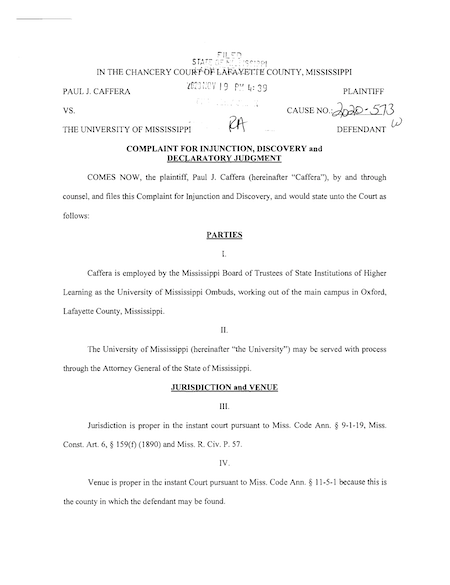
The Mississippi Free Press also does not know the whistleblowers’ identities and confirmed information they provided to us independently through other sources and by verifying the authenticity of the original emails files prior to publication of the initial UM Emails stories in August.
“Mr. Caffera has not engaged in any wrongdoing and has performed his duties in an exemplary manner for nearly four years,” Lewis told the Mississippi Free Press in Tuesday evening’s statement.
On Nov. 20, Caffera and his attorney participated in an interview with EORC Interim Director Gene Rowzee.
“Mr. Caffera fully cooperated in the investigation subject to the confidentiality requirements of his office,” Lewis said yesterday. “Mr. Caffera and his counsel made clear that Mr. Caffera was unable to disclose the names of persons using his office in regard to the issues at the School of Journalism and New Media.”
The Mississippi Attorney General’s office served Caffera’s complaint to the university on Nov. 23—three days before the Thanksgiving holiday. On Nov. 30, the Monday after Thanksgiving, Chancellor Boyce cancelled a planned face-to-face meeting with Caffera.
Later that day, Boyce sent Caffera an email informing him that the university was placing him on administrative leave starting on Dec. 1.
“No reason or justification (was) provided other than the pendency of the EO/RC investigation which had been going on for several weeks at this point,” Lewis said yesterday. “The university did not then and has not now pointed to any specific wrongdoing on Mr. Caffera’s part.”
The Mississippi Free Press broke the story about Caffera’s lawsuit and the university’s effort to compel him to overturn confidential information on Dec. 8.
On Monday, faculty and graduate students who support Caffera began circulating the petition backing him, accusing the university’s investigation of “what appear to be improper requests for confidential information explicitly protected by the charter of that office” that “seem designed to undermine its integrity and render it useless in the future for the purposes for which it was designed.”
“We urgently implore Chancellor Glenn Boyce to protect the Ombuds from all improper and retaliatory actions, including but not limited to abuses of office perpetrated by EORC, and to preserve its integrity for the good of the University community,” the letter stated.
‘It Sounds Like He Was Disappeared’
The letter’s signees come from a broad range of university departments, including the likes of University Libraries, Student Housing,english, history, biology and mathematics.
“In compliance with University Media Policy the signatories of this petition do not endorse its release to the public,” says the letter, which began circulating on social media on Monday.
Though Caffera has not been fired and his contract is not up until July, staff and graduate students received Chancellor Boyce’s email about the hunt for a temporary ombudsperson yesterday afternoon.
Boyce’s assurances that the university would ensure the Ombuds office remains a place where “every voice … can be heard, without fear of loss of privacy, retaliation or retribution” left some members of the faculty with little confidence.
“Nobody believes that email we just received,” tweeted UM Sociology Professor James M. Thomas.

For months, Thomas has been a target of Mississippi State Auditor Shad White, who claims the sociologist broke state law when he participated in the “Scholar Strike,” a nationwide effort to bring attention to racial injustice and policing issues as a teaching tool. The sociologist and his attorney, Rob McDuff, contend that his protest did not break the law. Still, Chancellor Boyce turned over Thomas’ teachings materials, class roster and communications with students.
Thomas is among those who signed the letter urging the administration to defend Ombudsman Paul Caffera and the office he holds. In response to Thomas’ tweet yesterday about Boyce’s remarks on the ombudsman, Jesse Cromwell, a UM history professor, offered his dystopian take on the meaning of the chancellor’s letter.
“It sounds like he was disappeared. ‘Who is Paul Caffera? There’s never been anyone working here by that name,’” tweeted Cromwell, who also signed Monday’s petition.
Thomas himself theorized that “our ombuds was forced out for protecting the independence of the ombuds office, which this email says is the priority.”
“It’s gaslighting,” the sociologist wrote.
‘Giving Voice to the Voiceless’
Neither Caffera nor his attorney learned that the chancellor was looking for an acting ombudsperson to fill the position he still holds until about 25 minutes after the rest of the schools’ employees received Boyce’s email yesterday.
“At 4:19 p.m., the Chancellor email(ed) a letter to faculty advising that he himself will name an acting temporary Ombuds (publicly implying that Mr. Caffera has been terminated),” Lewis said in his statement last night. “At 4:49, his counsel on behalf of Mr. Caffera (was) given a ‘heads up’ that the Chancellor had taken this action but clarifying that Mr. Caffera has not been terminated and is on administrative leave.”
Caffera’s attorney defended the ombudsman’s job performance in yesterday’s statement.
“Serving as Ombuds occasionally obliges Mr. Caffera to bring forward employee concerns to various levels of University leadership. Mr. Caffera performs his duties in accordance with the ethical standards for ombuds set forth by the International Ombudsman Association and in accordance with State law and University of Mississippi policies. … Mr. Caffera remains a paid employee of the University of Mississippi and has yet to be charged with any offense,” Lewis said.
Speaking through his lawyer and as a member of the International Ombudsman Association, Caffera defended the work of university ombudspersons nationwide.
“University ombuds officers fearlessly carry out their duties on campuses around the country despite knowing that by successfully giving voice to the voiceless and allowing concerns to be heard, they risk raising the ire of those who have behaved in ways counter to their campuses’ express values,” Caffera said.
“The hope is that if this occurs, a university’s leadership will defend the independence and actions of the campus ombuds office and ombuds officer.”
Editor’s Note: In the reporting of the UM emails series and follow-up reports, the MFP did not confer with members of either of our boards or any donors associated with the University of Mississippi to avoid conflicts of interest.
Also see: From Racist Emails to ‘Witch Hunts’: A UM Emails Timeline
Watch: Reporter Ashton Pittman and Editor Donna Ladd discuss the series during the 2021 Ancil Payne Award for Ethics in Journalism ceremony (40:00) and read more about the award here.
Read the full UM Emails reporting series to date:
- ‘The Fabric Is Torn In Oxford’: UM Officials Decried Racism Publicly, Coddled It Privately
- ‘The Ole Miss We Know’: Wealthy Alums Fight To Keep UM’s Past Alive
- UM’s ‘Culture Of Secrecy’: Dean Quit As Emails Disparaging To Gay Alum, Black Students Emerged
- ‘Appalling’: UM Provost Decries ‘Hurtful’ Emails About Black Women, Gay Alum
- Ole Miss’ Coddle Culture: Ole Miss Will Stay ‘Ole Miss’ Without Radical Shift
- EDITOR’S NOTE: The Decisions, Process, Motives Behind Ashton Pittman’s Series On UM Emails
- Perpetuating Patterns: It’s Time To Build A Better University Of Mississippi
- After UM Emails, Dean Plans ‘Anti-Racist’ Training, Donor Changes to ‘Remake Our School’
- ‘Ole Miss’ Vs. ‘New Miss’: Black Students, Faculty On How To Reject Racism, Step Forward Together
- UM Closely Guards Climate Survey Providing Window Into Social Issues, Sexual Violence
- UM Probes Whistleblowers Who Exposed Racist Emails As Ex-Dean Keeps $18,000 Monthly Salary
- ‘Our Last Refuge’: UM Faculty ‘Terrified’ As Officials Target Ombuds In Bid To Unmask Whistleblowers
- ‘Like He Was Disappeared’: UM Faculty Fear Retaliation After Ombudsman Put On Leave
- UM Appoints Acting Ombuds As Weary Faculty See Effort To ‘Stamp Out’ Anti-Racism Voices
- UM Retaliating Against Ombudsman for Protecting Visitors’ Privacy, Org Says
- UM Accuses Ombudsman of ‘Raising False Alarms’ Over Whistleblower Investigation
- A Matter Of Trust: UM Controversy Shows How Ombuds Programs Should, Shouldn’t Function, Expert Argues
- UM Pursuing ‘Criminal Investigation’ Into Whistleblowers Who Exposed Racist Emails
- Ombuds ‘Exonerated’ As UM Emails Whistleblower Hunt Fails to Identify Sources
- Will Norton, Ex-Dean in ‘UM Emails’ Race Saga, Quietly Departs University

